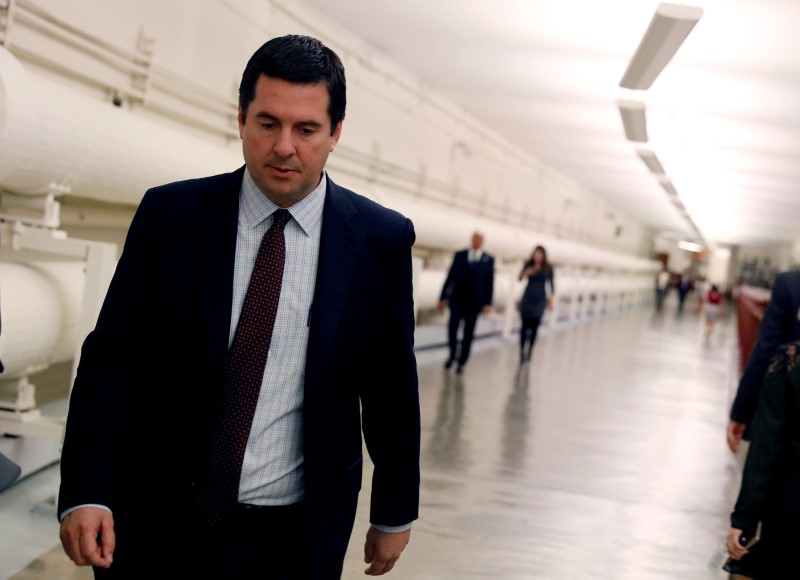By Mark Hosenball
WASHINGTON (Reuters) - The U.S. Justice Department and the FBI are resisting demands from a Republican lawmaker to hand over documents about a former British spy's dossier on purported Russian support for Donald Trump's 2016 election campaign, because the FBI has its own open criminal investigation, officials said.
The U.S. House of Representatives Intelligence Committee issued subpoenas in August seeking "any and all documents" about both agencies' dealings with former MI6 officer Christopher Steele, according to a letter seen by Reuters from committee chairman Devin Nunes, a Trump supporter.
Steele compiled the so-called Trump dossier, which Trump was told by FBI director James Comey contained salacious material about the businessman-turned president. Trump and his associates have said the dossier's contents were false.
Law enforcement and congressional officials said that the Justice Department and the FBI were reluctant to comply with the demand for documents as the FBI had its own probe, under the supervision of Special Counsel Robert Mueller, into U.S. allegations of Russian meddling in the 2016 campaign to tilt the November election in Trump's favor.
Moscow has repeatedly denied meddling and Trump has denied any collusion between his campaign and Russian officials.
Two officials said Nunes met with Deputy Attorney General Rod Rosenstein behind closed doors on Thursday to discuss the subpoenas.
"The Deputy Attorney General is meeting with Nunes as part of an ongoing negotiation over what information DOJ will provide or how it will be provided," a Justice Department official said.
The FBI declined to comment on anything to do with Nunes' request. A spokesman for Nunes declined to comment.
According to a Sept. 1 letter Nunes sent to U.S. Attorney General Jeff Sessions, the subpoenas demand that the department and the Federal Bureau of Investigation produce all documents related to their "relationship" with Steele and the "so-called 'Trump Dossier".
Such documents, the letter said, would include any payments the FBI made to Steele, and any efforts the government made to corroborate the contents of Steele's reports.
Sessions recused himself earlier this year from the Russia investigation. Nunes publicly recused himself from leading the Russia probe in April following a secret visit he paid to White House officials.
Democrats on the committee said Republicans issued the subpoenas in an attempt to discredit Steele. Republicans say it is important to understand the genesis of the dossier and whether it was created to sabotage Trump during his successful campaign for president.
Meanwhile, the Senate Judiciary Committee has also been battling with the Justice Department for months over its request to interview two FBI officials about Trump's dismissal in May of Comey as FBI chief, according to letters from the committee and the department.
The department twice refused to allow them to testify, according to the letters. On Sept. 22, it agreed that it would be "appropriate" for the officials to testify provided that it would be in a classified setting and did not interfere with Mueller's inquiry.

The Senate panel's chairman, Charles Grassley, had told reporters on Sept. 20 that the committee had begun drafting subpoenas to compel the testimony. In another letter dated Sept. 27, the conditions of the testimony still appeared to be in dispute.